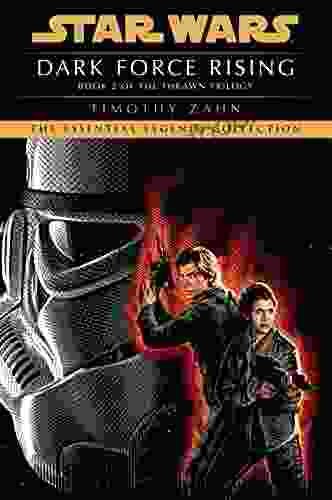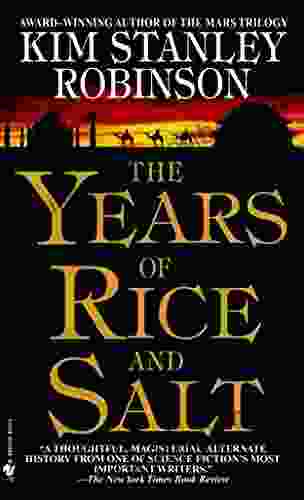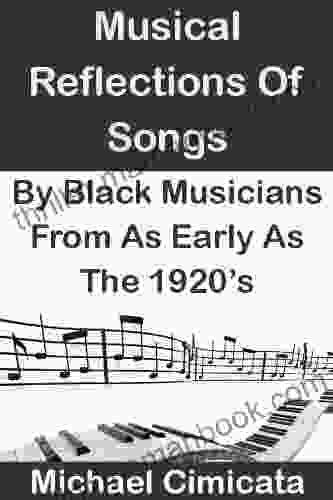Echoes of the Past: Musical Reflections of Black Musicians from the 1920s and Beyond

Music has always been a powerful force in American culture, and its ability to reflect and shape the social and political landscape has been particularly evident in the works of Black musicians. From the early days of the blues to the present day, Black musicians have used their voices and instruments to express their experiences, challenge injustices, and inspire hope.
The 1920s marked a pivotal era in American music, with the rise of jazz and the blues. These new genres provided Black musicians with a platform to showcase their unique talents and perspectives. Louis Armstrong, Duke Ellington, and Bessie Smith were just a few of the many legendary musicians who emerged during this time. Their music was not only popular, but it also had a profound impact on American culture.
5 out of 5
| Language | : | English |
| File size | : | 394 KB |
| Text-to-Speech | : | Enabled |
| Screen Reader | : | Supported |
| Enhanced typesetting | : | Enabled |
| Word Wise | : | Enabled |
| Print length | : | 81 pages |
| Lending | : | Enabled |
In the decades that followed, Black musicians continued to play a vital role in shaping American music. The civil rights movement of the 1950s and 1960s saw the rise of soul and Motown, two genres that reflected the struggles and aspirations of Black Americans. Artists such as James Brown, Aretha Franklin, and Marvin Gaye used their music to address social issues and to demand equality.
In the 1970s and 1980s, Black musicians continued to push musical boundaries. Hip-hop and rap emerged as new genres that gave voice to the experiences of young Black Americans. Artists such as Grandmaster Flash, Run-DMC, and Public Enemy used their music to challenge authority and to raise awareness of social justice issues.
In the 21st century, Black musicians continue to play a vital role in American culture. They have achieved mainstream success in a wide range of genres, from pop and R&B to rock and country. Artists such as Beyoncé, Jay-Z, and Kendrick Lamar have used their platforms to address social issues and to inspire change.
The Blues
The blues is a genre of music that originated in the African-American community in the Deep South in the late 19th century. It is characterized by its use of blue notes, a vocal style that is often mournful or melancholy, and a simple chord structure. The blues has been a major influence on the development of many other genres of American music, including jazz, rock, and hip-hop.
Some of the most famous blues musicians include B.B. King, Muddy Waters, and Robert Johnson. Their music often addressed themes of love, loss, and hardship. The blues also played an important role in the civil rights movement, as it provided a platform for Black musicians to express their frustrations and to demand equality.
Jazz
Jazz is a genre of music that emerged in the early 20th century in the African-American community in New Orleans. It is characterized by its use of improvisation, syncopated rhythms, and complex harmonies. Jazz has been a major influence on the development of many other genres of American music, including swing, bebop, and cool jazz.
Some of the most famous jazz musicians include Louis Armstrong, Duke Ellington, and Ella Fitzgerald. Their music often reflected the social and political issues of their time. Jazz also played an important role in the civil rights movement, as it provided a platform for Black musicians to express their frustrations and to demand equality.
Soul
Soul is a genre of music that emerged in the late 1950s and early 1960s in the African-American community in the United States. It is characterized by its use of soulful vocals, a strong emphasis on rhythm, and a combination of gospel, R&B, and pop influences. Soul music has been a major influence on the development of many other genres of American music, including funk, disco, and hip-hop.
Some of the most famous soul musicians include Aretha Franklin, James Brown, and Otis Redding. Their music often addressed themes of love, loss, and social justice. Soul music also played an important role in the civil rights movement, as it provided a platform for Black musicians to express their frustrations and to demand equality.
Motown
Motown is a record label founded in Detroit, Michigan, in 1959. It is best known for its roster of successful soul and R&B artists, including The Supremes, The Temptations, and Stevie Wonder. Motown's music was often characterized by its catchy melodies, upbeat tempos, and polished production values. It played an important role in the integration of Black music into mainstream American culture.
Hip-Hop
Hip-hop is a genre of music that emerged in the Bronx, New York City, in the early 1970s. It is characterized by its use of rapping, a vocal style that involves rhythmic speech over a beat, and its emphasis on dance and graffiti. Hip-hop has been a major influence on the development of many other genres of American music, including rap, R&B, and pop.
Some of the most famous hip-hop artists include Grandmaster Flash, Run-DMC, and Public Enemy. Their music often addressed themes of social justice, violence, and poverty. Hip-hop has also played an important role in the Black Lives Matter movement, as it has provided a platform for Black artists to express their frustrations and to demand equality.
The music of Black musicians has had a profound impact on American culture. It has reflected the struggles and aspirations of Black Americans, and it has played a vital role in shaping the American music landscape. From the blues to jazz to soul to hip-hop, Black music has provided a voice for the voiceless and a soundtrack for the American experience.
References
- Giddins, Gary. Visions of Jazz: The First Century. Oxford University Press, 2004.
- Oliver, Paul. The Story of the Blues. Northeastern University Press, 1998.
- Smith, Andy. The Oxford Companion to Soul Music. Oxford University Press, 2013.
- Toop, David. The Rap Attack: African Jive to New York Hip Hop. Serpents Tail, 1984.
5 out of 5
| Language | : | English |
| File size | : | 394 KB |
| Text-to-Speech | : | Enabled |
| Screen Reader | : | Supported |
| Enhanced typesetting | : | Enabled |
| Word Wise | : | Enabled |
| Print length | : | 81 pages |
| Lending | : | Enabled |
Do you want to contribute by writing guest posts on this blog?
Please contact us and send us a resume of previous articles that you have written.
 Top Book
Top Book Novel
Novel Fiction
Fiction Nonfiction
Nonfiction Literature
Literature Paperback
Paperback Hardcover
Hardcover E-book
E-book Audiobook
Audiobook Bestseller
Bestseller Classic
Classic Mystery
Mystery Thriller
Thriller Romance
Romance Fantasy
Fantasy Science Fiction
Science Fiction Biography
Biography Memoir
Memoir Autobiography
Autobiography Poetry
Poetry Drama
Drama Historical Fiction
Historical Fiction Self-help
Self-help Young Adult
Young Adult Childrens Books
Childrens Books Graphic Novel
Graphic Novel Anthology
Anthology Series
Series Encyclopedia
Encyclopedia Reference
Reference Guidebook
Guidebook Textbook
Textbook Workbook
Workbook Journal
Journal Diary
Diary Manuscript
Manuscript Folio
Folio Pulp Fiction
Pulp Fiction Short Stories
Short Stories Fairy Tales
Fairy Tales Fables
Fables Mythology
Mythology Philosophy
Philosophy Religion
Religion Spirituality
Spirituality Essays
Essays Critique
Critique Commentary
Commentary Glossary
Glossary Bibliography
Bibliography Index
Index Table of Contents
Table of Contents Preface
Preface Introduction
Introduction Foreword
Foreword Afterword
Afterword Appendices
Appendices Annotations
Annotations Footnotes
Footnotes Epilogue
Epilogue Prologue
Prologue L J Shen
L J Shen Matthew Zapruder
Matthew Zapruder Helen E Fisher
Helen E Fisher Marie Brennan
Marie Brennan Melanie Jacobson
Melanie Jacobson Caroline Mitchell
Caroline Mitchell Jay Verney
Jay Verney Bertolt Brecht
Bertolt Brecht Oyinkan Braithwaite
Oyinkan Braithwaite Ugonna Wachuku
Ugonna Wachuku Niel Schreiber
Niel Schreiber Ezra Klein
Ezra Klein Anneke Vanmarcke Forzani
Anneke Vanmarcke Forzani Neal Sehgal
Neal Sehgal Kindle Edition
Kindle Edition Lakota Grace
Lakota Grace Matthew Campbell
Matthew Campbell Michael Arkush
Michael Arkush Jack Jennings
Jack Jennings Thrity Umrigar
Thrity Umrigar
Light bulbAdvertise smarter! Our strategic ad space ensures maximum exposure. Reserve your spot today!

 Kenzaburō ŌeAn Uncensored History Of Darpa: America's Top Secret Military Research Agency
Kenzaburō ŌeAn Uncensored History Of Darpa: America's Top Secret Military Research Agency
 Carlos FuentesStar Wars Legends: The Thrawn Trilogy - An Epic Journey into the Star Wars...
Carlos FuentesStar Wars Legends: The Thrawn Trilogy - An Epic Journey into the Star Wars... Russell MitchellFollow ·16.5k
Russell MitchellFollow ·16.5k Ronald SimmonsFollow ·8.5k
Ronald SimmonsFollow ·8.5k Don ColemanFollow ·12.5k
Don ColemanFollow ·12.5k Natsume SōsekiFollow ·15k
Natsume SōsekiFollow ·15k Zachary CoxFollow ·14k
Zachary CoxFollow ·14k Nikolai GogolFollow ·8.7k
Nikolai GogolFollow ·8.7k Duane KellyFollow ·10.9k
Duane KellyFollow ·10.9k Grayson BellFollow ·19k
Grayson BellFollow ·19k

 Caleb Carter
Caleb CarterThe Complete Beagle Dog Beginners Guide: Beagle Facts,...
Beagles are...

 Gage Hayes
Gage HayesThe Origins and Evolution of No Child Left Behind:...
The No Child Left Behind...

 George Martin
George MartinThe Love Pirates: A Swashbuckling Tale of Love,...
The Love Pirates is a thrilling...

 Nathaniel Hawthorne
Nathaniel HawthorneDifferentiating the Curriculum for Gifted Learners:...
Gifted learners are...

 Carlos Fuentes
Carlos FuentesThe Years of Rice and Salt: A Journey Through a Forgotten...
The Years of Rice and Salt is...

 Herbert Cox
Herbert CoxThe Intricate Design of Clothing Manufacturing Processes:...
The clothing industry is a vast and...
5 out of 5
| Language | : | English |
| File size | : | 394 KB |
| Text-to-Speech | : | Enabled |
| Screen Reader | : | Supported |
| Enhanced typesetting | : | Enabled |
| Word Wise | : | Enabled |
| Print length | : | 81 pages |
| Lending | : | Enabled |








